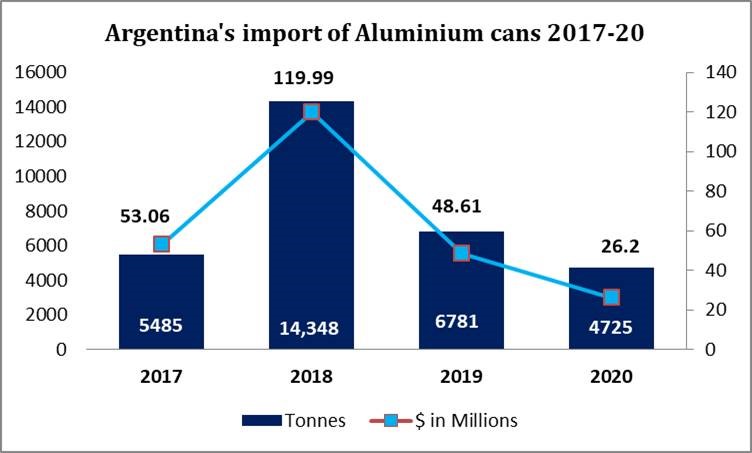

Argentina benefits from rich natural resources, a highly literate population, an export-oriented agricultural sector, and a diversified industrial base. Argentina's economic performance has historically been very uneven, with high economic growth alternating with severe recessions. The major industries of the South American nation are food processing and beverages motor vehicles and auto parts appliances and electronics machinery and equipment chemicals pharmaceuticals glass steel and aluminium cement textiles tobacco products publishing furniture leather.

The aluminium cans import of Argentina during 2017-19 displays highly uneven, as the import volume during the phase recorded, was 26,614 tonnes and the expenditures stood at $221.66 million. The estimated import for 2020 was evaluated at 4725 tonnes and the foreign revenue expenditure on it might remain at $26.20 million. However, when the analysed import volume and expenditure get added to the existing three years it stands at 31,339 tonnes and $247.86 million respectively.
In 2017, the aluminium cans import stood at 5485 tonnes and the revenue expenditure remained at $53.06 million, whereas in 2018 the aluminium cans importation saw a rapid growth by 161.58%, as the import volume stood at $119.99 million.
The aluminium cans import for 2019 was reflected with a downfall by 52.73%, as the import volume dipped to 6781 tonnes and the expenditure also dropped at $48.61 million.
The projected import for 2020 has also been analysed with down-turn by 30.32%, as the import volume is expected to reach at 4725 tonnes and expenditures also to fall at $26.20 million.
Argentina’s aluminium cans importation is from Brazil, Chile, China, Finland, Germany, India, Italy, South Africa, Spain, UK, USA, Venezuela, etc.
Responses








